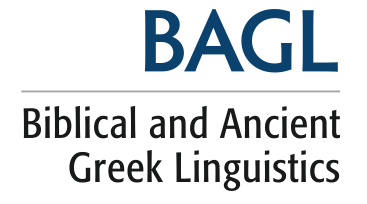8.1 | Stanley E. Porter McMaster Divinity College, Hamilton, Ontario This review article examines two major works comprising a total of six volumes
on Systemic Functional Linguistics (SFL). One is a collection in five volumes of
selected works representative of the history of SFL from its origins to the present,
co-selected by one of the major figures in this linguistic model. The other is a
singlevolume handbook to SFL with essays by a wide range of SFL practitioners on an
equally wide array of topics. Keywords: Systemic Functional Linguistics, linguistics, grammatics, grammatical
description, context, register, genre |
8.2 | Zachary K. Dawson McMaster Divinity College, Hamilton, Ontario A wave of research that began in the late 1970s and culminated with Richard
Burridge’s What Are the Gospels? in 1992 effectively established the consensus that
the Gospels are to be classified as ancient βίοι. In this article, I respond to
Burridge’s work to demonstrate that his approach to genre is problematic in several
ways, which calls the foundation of the current consensus into question. Following
this ground clearing exercise, I articulate a way forward in how to understand the
relationship between the Gospels’ genre and their social purpose, which is more in
keeping with modern genre theory, especially as it is envisioned by
systemic-functional linguists. The last section of the article then demonstrates the
potential benefits of using Systemic Functional Linguistics genre theory by means of
a sample genre analysis of the Lord’s Prayer in Matt 6:7–13, which demonstrates how
to understand the social function of genres and opens an avenue for fresh research
into the question of Gospel genres. Keywords: genre theory, genre criticism, gospels, Systemic Functional Linguistics,
register, βίος, ancient biography |
8.3 | David I. Yoon McMaster Divinity College, Hamilton, Ontario Interpreters may tend to reach conclusions on the topic or subject matter of a
text without having any criteria for how to determine it. Systemic Functional
Linguistics offers a method by which one can determine what the text is about,
including at the various levels of clause, clause complex, and discourse. The basis
of analyzing the ideational meaning of a text (i.e., the subject matter) is the
transitivity network, which exists at the clause level. This article outlines a
method for analyzing transitivity in Koine Greek to determine the subject matter of
the body of Paul’s letter to the Galatians. Keywords: Galatians, transitivity network, ideational metafunction, field, participant,
process, circumstance, verbal aspect, case, the law, subject matter, topic,
theme |
8.4 | Ji Hoe Kim McMaster Divinity College, Hamilton, Ontario This paper explores how Hallidayan systemic-functional theory and method can
advance current discussions of orality and textuality in Gospel Studies.
Theoretically, the Hallidayan view challenges Kelber’s view of the discontinuity
between oral and written media, establishing a continuum between spoken and written
language. An application of Halliday’s method for measuring the degree of orality in
a text demonstrates its relevance for Greek texts. As far as the Temple cleansing
episodes are concerned (Matt 21:12-17; Mark 11:15–19; Luke 19:45–48; and John
2:13–22), the data conform to the general consensus that Markan language is more
spoken language. Keywords: spoken and written language, Halliday, Systemic Functional Linguistics,
lexical density, grammatical intricacy, oral tradition |

